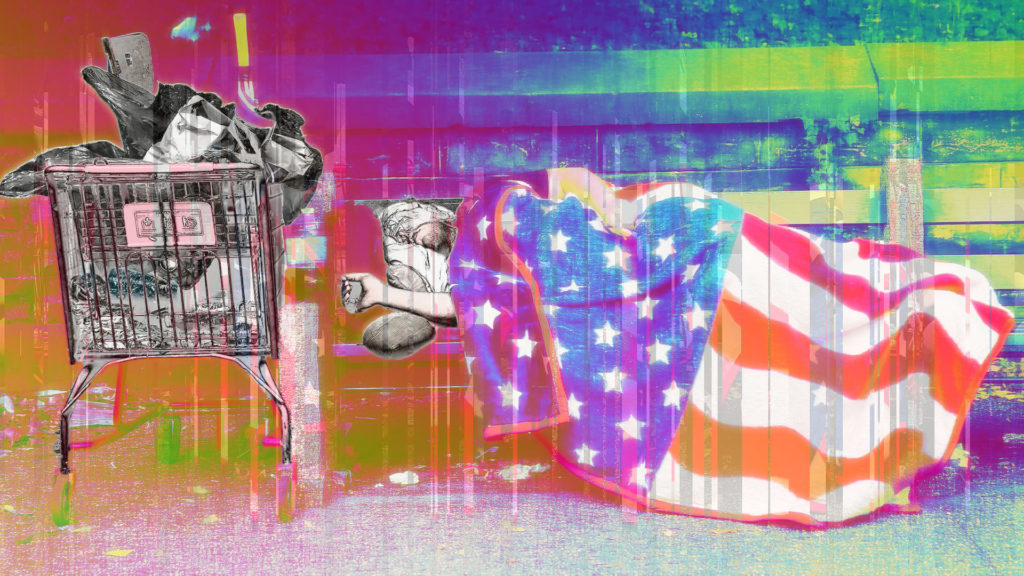There’s a sequence in the movie Parasite where a flood has 2 drastically different effects to 2 separate groups of people. The wealthy upper class Park family is mildly inconvenienced. They have to cancel an expected camping trip and drive home in a particularly bad thunderstorm. The worst that happens to them is they get drenched walking into their enormous house from their luxury car. The working class Kim family’s basement apartment is devastated by the flooding, nearly all their meager possessions wiped out, and must spend the night in an emergency gymnasium shelter. The Kim family is kicked when they are already down, and the Park family float above the flood like a party yacht.
The vastly different effects of a sudden crisis are always reflective of the society in which they happen, and in the US, we’re learning how fragile and precarious this whole house of cards really is. America is a gangster capitalist state built on flammable orange crates, the mega rich ready to bust the place if we start demanding too many concessions (like not dying). “Shame if something were to happen to that there economy during a global pandemic. Now fuckin’ pay me,” they say with a sinister corporate smile, holding a lit match.
Coronavirus is teaching us 2 valuable lessons, and not about hygiene.
The first lesson is that the current American system is not at all strong or resilient in the face of adversity, but rather a pathetically brittle system mere moments from falling apart, duct-taped together and sustained purely on prayer power that our money won’t catch on fire. For the rich, their trough is infinite, their benefactors well paid, and the slop never runs out.
Last week’s stock market rollercoaster and oil crash spell a stormy economic year for the rest of us as the powers in charge hold their hand out for a sack of public money, jet off to doomsday bunkers, bullshit us into calming down, or confusedly try and spin what the germophobe moron in the White House is rambling about today.
Store shelves are empty of hygiene essentials, an accusation aimed almost exclusively at leftist governments under enormous sanctions or blockade. A panicky, willfully misinformed public so used to being told what to do suddenly fights each other for toilet paper. Scammers trying to rip people off for hand sanitizer go unpunished, except in the court of public opinion.
One of America’s original sins, its grotesque suburban sprawl, might end up being more helpful in this case, since it’s designed to keep people isolated and stupefied. This will made local mutual aid all the more important, but I wonder how the middle glob of lawn dads and wine moms will react to having to actually help each other without cash payment in return. I have a feeling if things get too crazy, they’ll just each other alive. The working class, as it’s always been, is on its own. This cannibalization will consume straight up the juicy guts of American capitalism, with the service economy and Uberconomy feeling the brunt first. These don’t even have the most basic of protections when things aren’t in freefall.
The other lesson is that a better world of human decency is possible, it’s easy to provide, but that it’s just not. It’s the world promised by a humane system of economics, ecology, and basic decency; a world liberated from neoliberal transaction mindset.
Several cities, states, organizations, and companies have independently called for or even passed:
- Flexible working hours/working from home
- Eviction freezes
- Paid sick leave
- Food assistance for needy/schoolkids
- Mortgage payment suspensions
- Student loan payment deferrals
- More robust public healthcare
- Emergency UBI payments
To end out this week of uncertainty, we get Pelosi’s pathetic compromise response bill when she had an enormous amount of leverage, a clear moral mandate that was politically viable to contrast themselves with a bumbling incompetent White House response. But yet again, we get Lucy with the football and Charlie Brown, another example of Democrats self-negotiating themselves out of a good idea before they’re even at the bargaining table. What a cowardly leadership of corporate lapdogs, scared to death to make any demands of capital, dare they threaten their own comfy positions as “principled” but toothless defenders of moral victories so vague and incomprehensible they might as well not have existed at all.
Some of the boundaries to leading a better, healthier, less stressful life can effortlessly be cast aside, it seems. Makes you wonder why they were arbitrarily put up in the first place. Then you start asking who did this. Then you answer your own question because they’re on TV taking credit for strangling us for so long. The corporate state keeps you stressed and powerless through economic strong-arming and Democratic brand loyalists keep voting for more of the same because they were never really on your side to begin with. When Pete Buttigieg does his pained monologue to an empty studio, what you’re looking at is a perfect summation of who they are and what they represent.
Remember when all of this is over, they could have always done these things, they just didn’t.
The crisis didn’t start in January, it was always here, always around us, moving in slow motion. So quietly punishing, we just got used to it. Precariousness and austerity became all we knew because the people doing it to us never had the imagination or the courage to stop it. We’re just now seeing the cliff edge, and we’re slamming on the brakes once and for all. So I guess we’ll just have to make it for ourselves.
That’s the wonderful possibility of this moment; that people realize they were always on their own and need to look to each other for mutual aid, social connection (even when distant), and taking care of each other independent of a flawed capitalist convulsion. The suburbanites and PMC’s will not save you through the ineffable electoral magic of Joe Biden. Pooling resources, sharing our time and energy, and reconnecting our frayed selves from our shellshocked post-recession trauma.
Carl Wilhoyte is the co-editor and co-founder of Zero Balance. His work has appeared in Street Fight Radio, District Sentinel, Abomination Magazine, Bourbon Penn, and Farmhouse Magazine.

